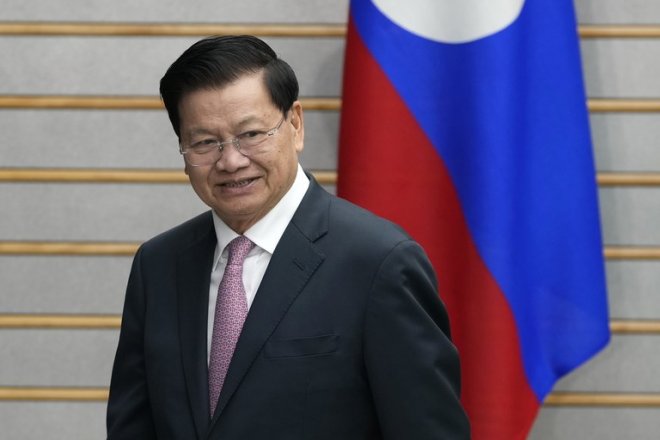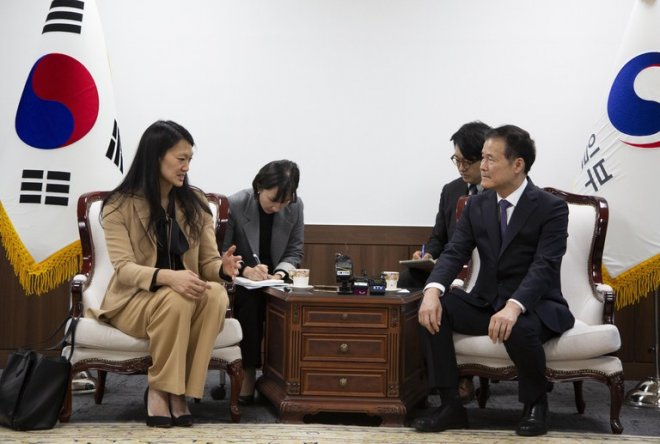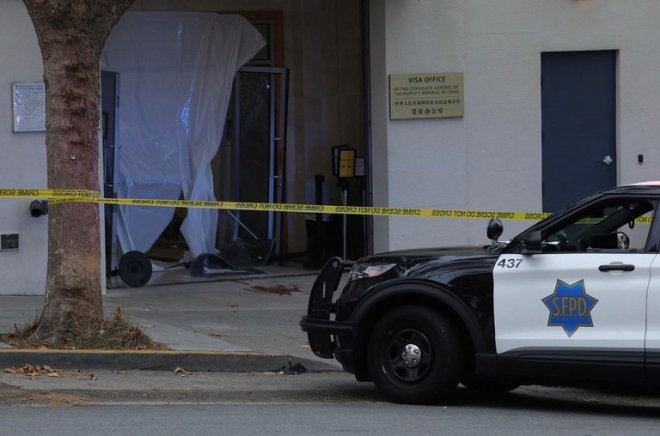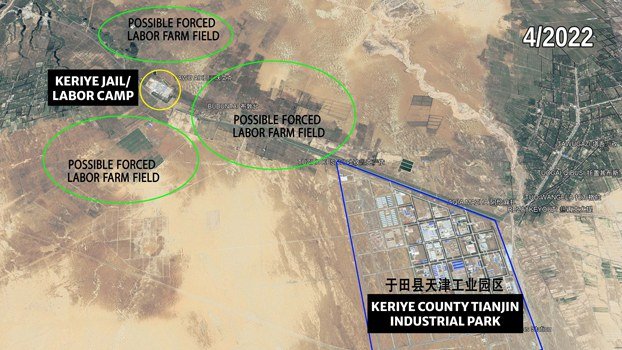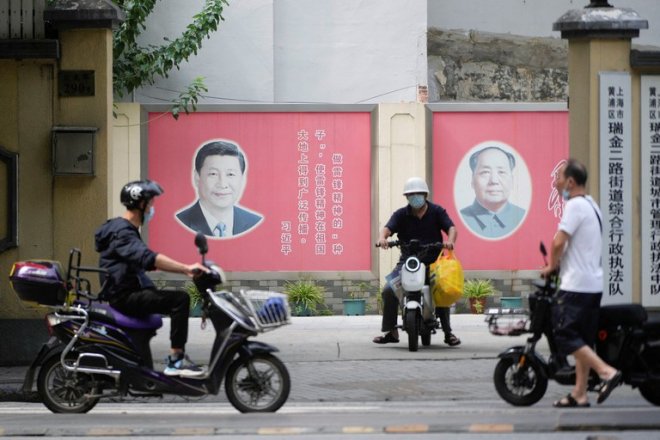Apple Daily staffers recall the police raid that changed Hong Kong's media overnight
Jimuk will never forget the day dozens of national security police charged into the Apple Daily"s editorial offices, separating staff from their computers, removing large quantities of confidential documents, freezing its assets and later arresting several executives and senior editors."The worst thing was that the day they arrested several high-level executives was actually my birthday, so I have felt very sad on my birthday these past couple of years," he said.
"I feel very bad that they have been sitting in jail for the past two years," he said.
The Apple Daily, founded by pro-democracy media magnate Jimmy Lai, was raided by national security police on June 17, 2021, becoming one of the biggest casualties of draconian national security law imposed by the ruling Communist Party in a bid to suppress the 2019 protest movement.
Five days later, as the paper shut down for good, a group of editors and reporters gathered outside the headquarters of Lai"s Next Digital media empire, bowing to their readers to show gratitude for their support over the years.
"We are the Apple Daily editorial team, including reporters, and we have something to say to the people of Hong Kong – thank you," one said.
The last edition of the paper sold a record-breaking 1 million copies, with people lining up on the street from the early hours to get their piece of Hong Kong history, making a bittersweet end to 26 years of the paper’s sensationalist, hard-hitting style and its cheery apple logo.
Two years later, the doors of Next Digital"s former headquarters are boarded up, and the company"s name has been erased from the bus stop outside.
Leaving Hong Kong, journalism
Radio Free Asia caught up with four of its former journalists in recent weeks, marking the second anniversary of the raid.
Not many former Apple Daily staffers – who once numbered around 600 – are still in journalism, while an estimated 1 in 10, have left Hong Kong for a new life overseas.
 Police officers from the national security department escort Chief Operating Officer Chow Tat-kuen from the offices of Apple Daily and Next Media in Hong Kong, June 17, 2021. Credit: Lam Yik/Reuters
Police officers from the national security department escort Chief Operating Officer Chow Tat-kuen from the offices of Apple Daily and Next Media in Hong Kong, June 17, 2021. Credit: Lam Yik/ReutersMeanwhile, at least 15 other media outlets have since also shut down, either because they were also being investigated by the national security police, or as a pre-emptive decision.
Of the former journalists who spoke to RFA Cantonese, some have changed careers, others have emigrated, and some have gone back to school.
And some diehards have clung to their profession because they believe very strongly in the idea of a free press for Hong Kongers – wherever they are in the world.
Three former staff members, who gave only the pseudonyms Ah Y, Ah A, and Jimuk for fear of political reprisals against themselves or their loved ones, spoke to Radio Free Asia about their current plans and their memories of the crackdown, which proved so fateful not just for the Apple Daily, but for Hong Kong.
A fourth – Taiwan-based Photon News website founder Leung Ka Lai – agreed to speak on the record.
More than a job
All are still struggling in their own way to come to terms with the loss of their paper, which was so much more than a job, and which has become a symbol of the crackdown on dissent and peaceful political opposition in Hong Kong since the protest movement tried to take issue with the erosion of the city"s promised freedoms.
"I worked for the Apple Daily for more than 20 years – that place took all of my blood, sweat and tears. Anyone who says they don"t miss the place is lying," Ah Y said.
 Members of the press take photos as executive editor in chief Lam Man-Chung
Members of the press take photos as executive editor in chief Lam Man-Chung proofreads the final edition of the Apple Daily newspaper before it goes to print in Hong Kong late on June 17, 2021. Credit: Anthony Wallace/AFP
For Ah A, it"s the openness of the interactions with colleagues he misses the most.
"That open atmosphere made me very happy to go to work,” he said. “I miss that rapport with my colleagues, and I miss the feeling of everyone working together."
Jimuk said he still treasures every moment he spent working there.
"I haven"t forgotten anything about the paper over the last two years because I invested so much in it, both mentally and emotionally, and did some good work there," they said.
For Ah Y, who now lives in the United Kingdom, there seems to be little point in staying in the industry at all. "These days being a journalist seems pretty pointless," he said, adding that he hadn"t planned on leaving the profession, and isn"t sure what to do now.
"It"s not easy to just change careers after 20 years in journalism," he said. "I"ve spent more than half of my working life doing this job, and I always thought I would keep doing it until I retired."
Ah Y now does manual labor in Britain.
"Being a journalist has lost its meaning in this day and age," he said. "It would feel like going through the motions, like a zombie. And there isn"t much of a future in it for young people."
Keeping the spirit alive
Jimuk is carrying out academic research into the Apple Daily in Taiwan, and teaching students from Taiwan and the rest of the world about the demise of press freedom in Hong Kong and about the 2019 protest movement.
He feels that he"s still working as a communicator, only in a different venue and profession.
"I often think about how to keep the spirit of the Apple Daily alive," he said. "Also about how we can help preserve its history. My aim over the next few years is to create an academic archive detailing more than two decades of Apple Daily history.”
Ah Y has also written about Hong Kong for some Taiwanese news organizations, something he has been grateful for because he feels as if he is helping Hong Kong from overseas.
Ah A decided to brave the chilly political climate and stay in Hong Kong, but hasn"t managed to find another reporting job, as his resume is now tainted by his association with his former paper.
Instead, he has worked in sales, data analysis and as an Uber driver since the paper"s demise.
He said media organizations in Hong Kong now appear reluctant to hire him.
"Journalists I have worked with from other media organizations have invited me to interview, and I went to more than one that was on the point of hiring me, but then didn"t get approval from the highest level," he said.
"Each time it was because I was one of the last journalists to leave the Apple Daily," he said.
Excluded
It seems that being a former Apple Daily journalist is now something akin to the Black Five Categories of the Cultural Revolution of 1966-1976 in mainland China – a recipe for vilification and exclusion, according to its former staffers.
Some former journalists at the paper have even been turned down for teaching positions in universities.
"It"s a shame, because I would never have done this job for so long if I didn"t really love it," said Ah A, who was a journalist for 16 years. "But the industry is changing so rapidly that I probably wouldn"t be able to bear it. I"m getting a bit long in the tooth for that."
"I prefer the challenge of trying a different career altogether," he said.
As the ruling Communist Party tightened its grip on Hong Kong in the wake of the 2019 protest movement, it "gutted" press freedom in the city, according to journalists and overseas rights groups.
Since the national security law took effect on July 1, 2020, Hong Kong has plummeted from 18th to 140th in Reporters Without Borders" annual press freedom index.
![]()
Last hurrah
The 2019 protest movement, which was covered round-the-clock by a dedicated press corps who braved constant street battles between protesters and riot police, may have been its last hurrah.
With daily drone footage, live-tweeting, live streams, running commentary, political debate and in-depth interviews with participants, Hong Kong"s journalists offered a depth and intensity of coverage that hasn"t been seen in the city since.
That year, they really fulfilled their role as the fourth estate that holds governments to account and speaks truth to power.
But by the following year, the National Security Law had put an end to the activities of its once-intrepid press corps, barring the depiction of any scenes or slogans seen as “glorifying” the protesters or their aims.
Jimmy Lai, who was initially arrested and released on bail at the time of the national security raid, was taken back into custody, where he remains awaiting trial on national security charges.
He was also convicted of "fraud" in connection with the alleged misuse of Next Digital premises under the terms of its lease agreement.
Meanwhile, six former Apple Daily executives have pleaded guilty to "conspiring and colluding with foreign powers" under the national security law.
Other casualties
Six months after the raid on the Apple Daily, the pro-democracy Stand News website was also forced to close, with two of its senior editors prosecuted. A month later, Citizen News followed suit, saying it needed to shut down to keep its journalists safe.
"Four years on, the transformation has been shocking," Leung Ka Lai said. "Nobody thought this could happen, not even people with more than a decade of experience in Hong Kong media organizations."
"I used to think it would be something like the frog in the gradually heating pan of water, but actually, things changed overnight," she said.
![]() Employees, executive editor in chief Lam Man-Chung
Employees, executive editor in chief Lam Man-Chung
For Ah A, it"s the openness of the interactions with colleagues he misses the most.
"That open atmosphere made me very happy to go to work,” he said. “I miss that rapport with my colleagues, and I miss the feeling of everyone working together."
Jimuk said he still treasures every moment he spent working there.
"I haven"t forgotten anything about the paper over the last two years because I invested so much in it, both mentally and emotionally, and did some good work there," they said.
For Ah Y, who now lives in the United Kingdom, there seems to be little point in staying in the industry at all. "These days being a journalist seems pretty pointless," he said, adding that he hadn"t planned on leaving the profession, and isn"t sure what to do now.
"It"s not easy to just change careers after 20 years in journalism," he said. "I"ve spent more than half of my working life doing this job, and I always thought I would keep doing it until I retired."
Ah Y now does manual labor in Britain.
"Being a journalist has lost its meaning in this day and age," he said. "It would feel like going through the motions, like a zombie. And there isn"t much of a future in it for young people."
Keeping the spirit alive
Jimuk is carrying out academic research into the Apple Daily in Taiwan, and teaching students from Taiwan and the rest of the world about the demise of press freedom in Hong Kong and about the 2019 protest movement.
He feels that he"s still working as a communicator, only in a different venue and profession.
"I often think about how to keep the spirit of the Apple Daily alive," he said. "Also about how we can help preserve its history. My aim over the next few years is to create an academic archive detailing more than two decades of Apple Daily history.”
Ah Y has also written about Hong Kong for some Taiwanese news organizations, something he has been grateful for because he feels as if he is helping Hong Kong from overseas.
Ah A decided to brave the chilly political climate and stay in Hong Kong, but hasn"t managed to find another reporting job, as his resume is now tainted by his association with his former paper.
Instead, he has worked in sales, data analysis and as an Uber driver since the paper"s demise.
He said media organizations in Hong Kong now appear reluctant to hire him.
"Journalists I have worked with from other media organizations have invited me to interview, and I went to more than one that was on the point of hiring me, but then didn"t get approval from the highest level," he said.
"Each time it was because I was one of the last journalists to leave the Apple Daily," he said.
Excluded
It seems that being a former Apple Daily journalist is now something akin to the Black Five Categories of the Cultural Revolution of 1966-1976 in mainland China – a recipe for vilification and exclusion, according to its former staffers.
Some former journalists at the paper have even been turned down for teaching positions in universities.
"It"s a shame, because I would never have done this job for so long if I didn"t really love it," said Ah A, who was a journalist for 16 years. "But the industry is changing so rapidly that I probably wouldn"t be able to bear it. I"m getting a bit long in the tooth for that."
"I prefer the challenge of trying a different career altogether," he said.
As the ruling Communist Party tightened its grip on Hong Kong in the wake of the 2019 protest movement, it "gutted" press freedom in the city, according to journalists and overseas rights groups.
Since the national security law took effect on July 1, 2020, Hong Kong has plummeted from 18th to 140th in Reporters Without Borders" annual press freedom index.

Last hurrah
The 2019 protest movement, which was covered round-the-clock by a dedicated press corps who braved constant street battles between protesters and riot police, may have been its last hurrah.
With daily drone footage, live-tweeting, live streams, running commentary, political debate and in-depth interviews with participants, Hong Kong"s journalists offered a depth and intensity of coverage that hasn"t been seen in the city since.
That year, they really fulfilled their role as the fourth estate that holds governments to account and speaks truth to power.
But by the following year, the National Security Law had put an end to the activities of its once-intrepid press corps, barring the depiction of any scenes or slogans seen as “glorifying” the protesters or their aims.
Jimmy Lai, who was initially arrested and released on bail at the time of the national security raid, was taken back into custody, where he remains awaiting trial on national security charges.
He was also convicted of "fraud" in connection with the alleged misuse of Next Digital premises under the terms of its lease agreement.
Meanwhile, six former Apple Daily executives have pleaded guilty to "conspiring and colluding with foreign powers" under the national security law.
Other casualties
Six months after the raid on the Apple Daily, the pro-democracy Stand News website was also forced to close, with two of its senior editors prosecuted. A month later, Citizen News followed suit, saying it needed to shut down to keep its journalists safe.
"Four years on, the transformation has been shocking," Leung Ka Lai said. "Nobody thought this could happen, not even people with more than a decade of experience in Hong Kong media organizations."
"I used to think it would be something like the frog in the gradually heating pan of water, but actually, things changed overnight," she said.
 Employees, executive editor in chief Lam Man-Chung
Employees, executive editor in chief Lam Man-Chung and deputy chief editor Chan Pui-Man
cheer in the Apple Daily newspaper office after completing editing of the final edition in Hong Kong, June 23, 2021. Credit: AFP
Leung, who worked for 16 years as a journalist in Hong Kong, the last three of them at the Apple Daily, tried to stay on after the paper closed, working as a citizen journalist covering protests and political opposition.
But she has since moved to the democratic island of Taiwan, where she founded Photon News, a service for Hong Kong readers anywhere in the world.
‘Be water’
Leaving felt like the Bruce Lee maxim used by the 2019 protesters to denote a fluid approach to political opposition, "Be Water."
"I chose to leave because it turns out that there is some space to do my work here, enough freedom of expression," she said.
"Resistance takes many forms, and refusing to put up banners can be a form of resistance, if that"s what the regime wants you to do," Leung said. "I don"t want to put up protest banners -- I"m a journalist."
Yet Leung has found that self-censorship has dogged her shoestring news operation even in Taiwan, as people are reluctant to speak to the press due to risks under the national security law. There is also the need to protect her own employees.
“We are now overseas, in a place that isn"t threatened by Hong Kong"s National Security Law, but still have to consider the safety of anonymous colleagues, and sometimes there are decisions to be made about which stories to run, and how they should be written," Leung said.
While some former colleagues have carried on reporting via social media, there are concerns about how effective an option this can be in the longer term.
"There are lot of like-minded colleagues in Hong Kong who have started their own news platforms, and there seems to be some room for them to do that," Leung said, adding that while 12 media organizations have folded, 15 new services -- albeit smaller and less well-funded -- have sprung up to take their place.
"But Hong Kongers are pretty picky, and won"t just accept anything you feed them," she said, adding that the prospects for what little press freedom remains are looking grim, with the government planning further national security legislation.
Translated by Luisetta Mudie. Edited by Malcolm Foster.
[圖擷取自網路,如有疑問請私訊]
Leung, who worked for 16 years as a journalist in Hong Kong, the last three of them at the Apple Daily, tried to stay on after the paper closed, working as a citizen journalist covering protests and political opposition.
But she has since moved to the democratic island of Taiwan, where she founded Photon News, a service for Hong Kong readers anywhere in the world.
‘Be water’
Leaving felt like the Bruce Lee maxim used by the 2019 protesters to denote a fluid approach to political opposition, "Be Water."
"I chose to leave because it turns out that there is some space to do my work here, enough freedom of expression," she said.
"Resistance takes many forms, and refusing to put up banners can be a form of resistance, if that"s what the regime wants you to do," Leung said. "I don"t want to put up protest banners -- I"m a journalist."
Yet Leung has found that self-censorship has dogged her shoestring news operation even in Taiwan, as people are reluctant to speak to the press due to risks under the national security law. There is also the need to protect her own employees.
“We are now overseas, in a place that isn"t threatened by Hong Kong"s National Security Law, but still have to consider the safety of anonymous colleagues, and sometimes there are decisions to be made about which stories to run, and how they should be written," Leung said.
While some former colleagues have carried on reporting via social media, there are concerns about how effective an option this can be in the longer term.
"There are lot of like-minded colleagues in Hong Kong who have started their own news platforms, and there seems to be some room for them to do that," Leung said, adding that while 12 media organizations have folded, 15 new services -- albeit smaller and less well-funded -- have sprung up to take their place.
"But Hong Kongers are pretty picky, and won"t just accept anything you feed them," she said, adding that the prospects for what little press freedom remains are looking grim, with the government planning further national security legislation.
Translated by Luisetta Mudie. Edited by Malcolm Foster.
[圖擷取自網路,如有疑問請私訊]
|
本篇 |
不想錯過? 請追蹤FB專頁! |
| 喜歡這篇嗎?快分享吧! |
相關文章
AsianNewsCast








